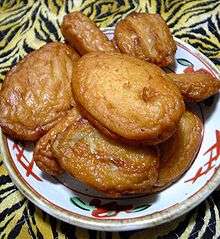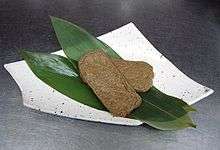Satsuma age


Satsuma-age (薩摩揚げ) is a fried fishcake from Kagoshima, Japan. Surimi and flour is mixed to make a compact paste that is solidified through frying. It is a specialty of the Satsuma region. It is called tsuke-age in Kagoshima and known as chiki-agi in Okinawa.
The paste is made from fish and seasoned with salt, sugar, and other spices and molded into several shapes. It is made not only from ground fish but can include 木耳 (wood ear), Beni shōga, onion, Welsh onion and other vegetables, squid, octopus, shrimp and other sea foods, and some spices. In fishing villages, it is made from local fishes, for example sardines, shark, bonito, mackerel, etc. In most cases it is made by mixing two or more kinds of fish.
People eat Satsuma-age plain or lightly roasted and dipped in ginger and soy sauce or mustard and soy sauce. It is used in oden, udon, sara udon or Nimono (stewed dishes).
Composition
Choice of fish
Commonly Satsuma-ages used cod as a filling; however, as cod stocks have been depleted other varieties of white fish are used, such as haddock or whiting. Satsuma-ages may use oily fish such as salmon for a markedly different flavour.
The fish used to make surimi (Japanese: 擂り身, literally "ground meat") include:
- Alaska pollock (Theragra chalcogramma)
- Lizardfish (Synodontidae)
- White croaker (Pennahia argentata)
- Daggertooth pike conger (Muraenesox cinereus)
- Japanese Spanish mackerel (Scomberomorus niphonius)
- Flying fish (Exocoetidae)
- Various sardine species (Sardine)
- Various shark species (Selachimorpha)
- Skipjack tuna (Katsuwonus pelamis)
- Various mackerel species (Mackerel)
- Okhotsk atka mackerel (Pleurogrammus azonus)
- Tilapia
- Black bass
- Smallmouth bass (Micropterus dolomieu)
- Largemouth bass (Micropterus salmoides)
- Florida black bass (Micropterus floridanus)
History
There are varied histories of Satsuma-age, but the most famous birthplace is the Satsuma district in Kagoshima.[1] It is said that, in about 1864, the Shimazu clan brought it to Satsuma from Okinawa through some exchange and invasion.[2] In those days, Okinawans called fried-boiled fish paste chigiage. After it was brought to Kagoshima, it was produced as tsukiage and selected as one of the best 100 local dishes.
Regional names
Depending on the region, the dish is known under different names. In Tohoku and Kantō region it is called "Satsuma-age" after its place of origin in Kagoshima. In the Chubu region it is known as "Hanpen", Hokkaido and west Japan people call it "Tempura". In Kyushu and Okinawa, this product is called "Tsukeage" or "Chikiagi".
Varieties

- Hiraten(ひら天): flat satsuma age
- Maruten(丸天): Satsuma-age like a thin disk. People in Kyushu, mainly Fukuoka, eat them with udon.
- Gobouten(ごぼう天, ごぼう巻き): Satsuma-age wrapped around burdock-like sticks.
- Ikaten(いか天): Satsuma-age wrapped around squid tentacles.
- Takoten(たこ天): Satsuma-age wrapped around cut octopus. There is a kind of ball shaped like takoyaki.
- Tamanegiten(タマネギ天): with onion.[3]
- Bakudan (爆弾, 'Bomb'): Satsuma-age which wrapped around a boiled egg
- Honeku (ほねく), honeten: These are short versions of honekuri-tempura. This is a local dish in north Wakayama. Whole cutlass fish (Largehead hairtail:Trichiurus lepturus) are ground and fried. They have a unique smell.
- Jakoten(じゃこ天) is a special product of Uwajima in southern Ehime prefecture. Jakoten has a long history, having been eaten since the Edo period. It is made from small fish caught nearby that are blended into a paste and then fried.
Varieties in other countries
- Gansu(がんす) (local dish in Hiroshima) is a fry made of breaded ground whitefish and a kind of cutlet.
- There are some similar foods in Vietnam.
- In Korea and Taiwan, Satsuma-age is sold under other names. Skewer paste is sold as oden, but Satsuma-age cut in small pieces are also called oden and served at restaurants. Tempura sold at Taiwan retails is mainly Satsuma-age. In Korea, the term for Satsuma-age is Eomuk (어묵) or simply odeng. Large cities like Busan and Seoul sell these products as street food during winter and fall seasons.
See also
References
- ↑ 【Kagoshima Prefecture Ichiki Kushikino City】 Sightseeing ・ Speciality:Speciality (Japanese)
- ↑ tsukeage Kagoshima Discovering Culture (Kagoshima Regional Information Web, Living Eye 8, November 2003)(Japanese)
- ↑ http://www.kahy.info/2008/05/post_666.html
External links
| Wikimedia Commons has media related to Satsuma age. |